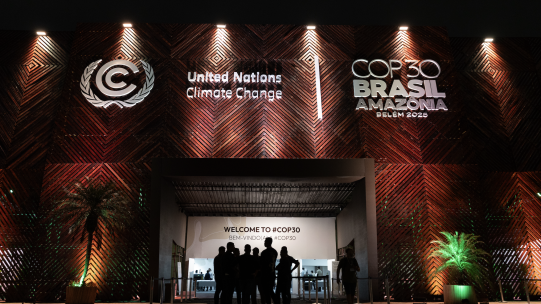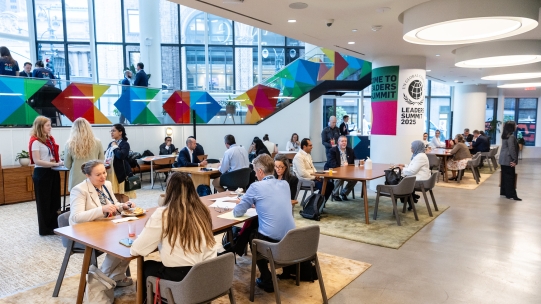Collective action brings clean fresh water to millions in Brazil
Read more

Dercilio Aristeu Pupin, an organic farmer in Piracaia, Brazil, knows firsthand just how devastating drought can be — and how collective action can respond with effective, promising results.
Pupin saw his once-fertile soil grow parched and his productive pastures dry up from the worsening effects of climate change. His livelihood, that of his community and that of millions of residents of the Piracicaba, Capivari and Jundiai (PCJ) river basin were at grave risk.
The PCJ river basin supplies more than 70 per cent of the region’s water, most notably supporting Brazil’s largest city of São Paulo. The region has gone through seven droughts in the last decade.
In response, Pupin and others, particularly student volunteers, collaborated on watershed restoration projects in the PCJ basin with the help of the São Paulo Water Fund. An initiative of The Nature Conservancy, the Water Fund helps with watershed protection and reforestation to provide fresh, clean water for millions of people.
The Water Resilience Coalition (WRC) of the United Nations Global Compact has mobilized its members to contribute to the Water Fund of São Paulo, recognizing that acting together creates greater and more sustainable impact. The WRC has brought together local producers, community leaders, Governments and businesses to build water resilience since its founding in 2020.
“The goal of generating positive impact for water – a central goal of the Coalition – depends on collective action,” said Renata Van der Weken, Supply Environment & Energy Director at Ambev, Brazil. In 2017, her company, a subsidiary of WRC member ABInBev, partnered with The Nature Conservancy to support the São Paulo Water Fund.
“Taking care of water is taking care of the next generations. Everyone dealing with sustainability deals with water,” Van der Weken said. “It is essential for human beings and for life on earth.”
Joining ABInbev in supporting the water fund have been four other WRC members -- The Coca-Cola Co., Cummins Inc., Ecolab and Starbucks -- helping to multiply the economic, biodiversity and health benefits far beyond the reach of a single company or partnership.
The Water Fund works with members of the Piracaia community like Pupin to incentivize nature-based solutions. A typical watershed restoration project might entail planting and safeguarding forests that naturally filter water and protect streamflow.
“I have the social responsibility to produce healthy food for people. But at the same time, I have to take care of the water sources,” said Pupin, who has farmed the region for the past decade.
“If there are other people who help me with this, it will be easier to provide healthy food faster for school meals, for supermarkets, for partners, and people who buy our products,” he said. “We’re aware that the water falling right there, to our side, benefits millions of companies, millions of people and inhabitants.”
Some 1,500 people are directly involved in on-the-ground projects of the São Paulo Water Fund, and 11,000 more are potential beneficiaries who live and work upstream in the watershed supported by its projects. Downstream are 12 million people living in and near São Paulo enjoying the benefits of a healthy watershed and a fresh, clean water supply.
Building on the progress of flagship projects such as that in Brazil, the WRC is rapidly expanding the collective action model around the world. The WRC now facilitates 21 projects in 15 basins across six countries - the U.S., Mexico, South Africa, India, Indonesia and Brazil.
In 2022, the WRC and Global Compact Network Brazil established the Brazil Chapter of the WRC, the first local chapter of the WRC. The Chapter brings together the Local Network, NGOs, multinational WRC members and local Brazilian companies to collaborate on multiple collective action water projects, such as the São Paulo Water Fund in prioritized basins.
“The Water Fund in São Paulo is a strategy that helps create ideal conditions to support conservation actions and implement nature-based solutions on the ground,” said Henrique Bracale, Coordinator of the São Paulo Water Fund at The Nature Conservancy, Brazil.
“We work with everyone from the federal government, the state government, the municipal governments up to the rural producers and key partners from the private sector,” he said. “The solution for ensuring water security for an entire society is through collaboration. Nobody does anything alone. We need to work together.”
Around the world, more than two billion people live in water-stressed regions due to environmental pressures that have intensified over time. According to UN-Water, the world must quadruple its efforts to reach global targets for water and sanitation by 2030.
To continue scaling up, in 2022, the WRC curated a list of 100 priority water-stressed basins. It mapped the basins’ needs related to water quantity, quality and access, and it built an initial list of collective action opportunities to address those needs directly. The WRC will leverage this work to catalyze action on water worldwide.
Along with plans to publish the full 100 basins list in 2023, the WRC will expand its new Basin Champions programme in which member CEOs and their companies serve as ambassadors for watersheds and local WRC activities. It also plans to recruit new members and launch additional Local Chapters.
All of that is welcome news to farmers like Pupin, who care deeply about sustainability and protecting our endangered resources.
“When someone decides to support a socio-environmental project, they are unleashing a process that their grandchildren will feel,” the farmer said. “The impacts are very big.”

